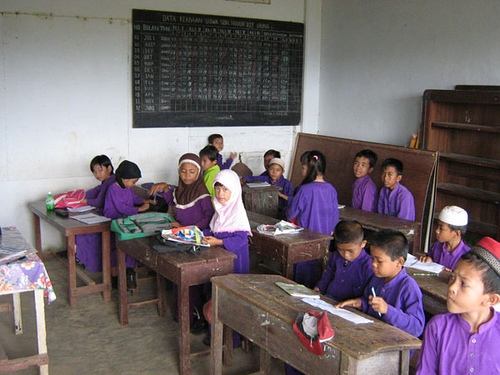More Religion, Less Science in Indonesia School Reform
Written by Mong Palatino On 18 August 2013 @ 23:06 pm |
In East Asia, Education, English, Governance, Indonesia, Politics, Weblog, Youth
Indonesia has recently implemented a curriculum reform [1] in over 6,000 schools which instantly generated backlash [2] owing to lack of preparations and the removal of Science, English, and Information Technology as separate subjects.
At the primary level, 11 subjects were reduced into 6 subjects while class hours were raised from to 26 hours to 30 hours every week. The teaching of the English language and science was merged with priority subject areas such as Bahasa Indonesia, nationalism and religious studies. Additional two hours were allocated for religious studies. At the senior high school level, students were required to join the national scouting organization for their extracurricular activity.
The focus [4] on civic and religious education is meant to develop the youth's "sense of morality and social responsibility." In particular, the reforms [5] were conceptualized to make students "tolerant and peaceful" in response to the growing problem of violence in schools.
New teaching methods were also introduced aside from promoting a curriculum that adopts the "integrative thematic concept."
Mirzatus Solikhah summarizes [6] the content of the school curriculum reform program:
The new curriculum fulfills three main components of education: knowledge, skill, and attitude. Knowledge is proved by the lesson in general. Skill is from their practical lesson like sports and attitude is reflected by implementing the additional time for religion subject.
The immediate impact might be the displacement of English and IT teachers:
English and IT (Information and Technology) teachers might lose their job.
In order for the reforms to work, the government must address the following issues:
At least there are three important things must be fixed. They are the textbook, teacher training; education governance.
But teachers complained that they were only given five days of training. Textbook shortages were also reported in several provinces. Jennifer learned [7] about the problem in the local paper:
The local newspaper just published a story today that most of the students in targeted schools have not even received their textbooks. When asked, the ministry's response was: get creative, search the materials on the internet, and photocopy them!
M. Faruq Ubaidillah is happy that the reforms will give students more time [8] to focus on fewer subjects:
…this gesture will lead students to spend their time effectively and efficiently in the class during the teaching and learning process. They have no need to focus on such many subjects which only make them baffled. Isn't better to have fewer subjects with more focus rather that many but less focus. Furthermore, English can be learned outside the school time.
But Harry Wardana didn't approve the removal [9] of Science and English as separate subjects:
If you take a look at most modern nations, they're really putting preposterous concern on advancement of science and technology. They believe that the advancement on science frontier will reset what it is for a nation to dream about. And sadly our government doesn't speak the same language, literally and figuratively.
What a depressing mental landscape.
Thalia also believes that the dropped subjects are essential [10] components of basic education:
Curriculum 2013 puts attitude on the higher priority than skill competencies and knowledge.
I wonder if the government forgot that for reaching the bright future good attitude must be accompanied by knowledge. Moreover, those subjects are very important for children's development.
Agita Sesara asks if the government and schools are ready [11] to implement the various reforms in the new curriculum:
…this will be a very fundamental change. This is not just a matter of eliminating subjects, but a complete alteration of the core teaching methods of the current pool of teachers. Will the teachers be able to keep up with the changes?
Are all the resources and personnel involved in education ready to adapt? If the answer is no, then the change will be nothing but an empty gesture.
International Education 2012 mentions [12] the accusation made by some groups that the reforms were done to justify the offering of more religious topics in the curriculum:
…critics of the proposal do not think that a curriculum overhaul is the answer. Some teachers worry that government and religious leaders are oversimplifying the problem and are using terms like "character building" and "morality" to justify more religious education.
Perhaps to appease critics, the government vowed [13] to hold a "Curriculum Census" next month to assess the impact of the reforms. It also allotted more funds for the training [14] of teachers in preparation for the nationwide implementation of the reforms next year.
| Reply via web post | Reply to sender | Reply to group | Start a New Topic | Messages in this topic (1) |
to Subscribe via email :
batavia-news-subscribe@yahoogroups.com
----------------------------------------
VISIT Batavia News Blog
http://batavia-news-networks.blogspot.com/
----------------------------
You could be Earning Instant Cash Deposits
in the Next 30 Minutes
No harm to try - Please Click
http://tinyurl.com/bimagroup
--------------

No comments:
Post a Comment